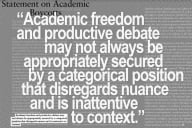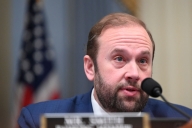You have /5 articles left.
Sign up for a free account or log in.
For a case study of what can go wrong in international student admissions and enrollment, look no further than North Dakota’s Dickinson State University.
An audit released earlier this year found that the university admitted students to programs it offered jointly with Chinese and Russian universities even though they lacked standardized English proficiency test scores and official transcripts; at least 15 students fell short of the 2.0 grade point average cut-off. Dickinson State received very little documentation directly from its partner institutions in China and Russia. Instead, the university relied almost wholly on information from overseas agents – paid per-capita commissions – who verified the students’ English language abilities.
As for transcripts, students adopted the DIY approach, using Microsoft Excel and university logos cut and pasted or purchased online.
Many of the programs were of the 2+2 variety: two years at the partner institution, followed by two years in North Dakota. Because of the lack of official transcripts, Dickinson State was unable to verify whether students had completed general education requirements at the partner institution. Furthermore, after arriving on Dickinson State’s campus, students frequently did not pursue the path of study outlined in one of the university’s 28 articulation agreements – only four of which were found to be valid, anyway. Ultimately, the audit found that of 594 Chinese and Russian students who earned degrees through Dickinson State’s “special international programs” since 2003, only 10 could be verified.
Since the release of the audit, the university – which earlier this month was placed “on notice” by its accreditor, the Higher Learning Commission of the North Central Association of Colleges and Schools -- has canceled its articulation agreements with international institutions and terminated its relationships with agents. Administrators have requested and are reviewing the official transcripts of students currently enrolled in the special international programs, as well as those of former students who wrongfully received degrees, to identify what coursework is missing and how those requirements could still be met. Hereafter, prospective international students must submit scores from either the Test of English as a Foreign Language or the International English Language Testing System, and their transcripts must be certified by an independent credential evaluation agency.
“All of us as institutions talk about our core values – integrity, academic quality, those kinds of things,” said D.C. Coston, who ordered the investigation of international programs shortly after assuming Dickinson State’s presidency last August. “In everything that we do, we need to be thinking about what those core values are. That’s what we’re trying to do going forward from here.”
“We’re looking more at marketing and recruitment rather than the standards of credential evaluation that were long a hallmark of international admissions.”
--Patty Croom, associate director of international admissions at Michigan State University
Dickinson State’s is a cautionary tale. But Dale Gough, director of the American Association of Collegiate Registrars and Admissions Officers’ International Education Services -- a credential evaluation unit that has worked with Dickinson State in remedying its problems – warned that it’s not a singular case.
“There are a lot of institutions that are quite happy dealing with agents,” Gough said. “They’re blissful in their ignorance. They don’t want to consider issues like, are the records we’re getting – if we’re getting any records at all – are they legitimate, are they accurate, or have they been verified? I think a lot of institutions don’t really want to know the answer to that question.”
A Blind Eye?
The problem of illegitimate records in international applications isn’t new, but experts are increasingly raising alarms about its prevalence. And they’re asking questions about whether some of those institutions that are relatively new to international student recruiting – places like Dickinson State – have the protocols and people in place to vet international student credentials. As one admissions professional put it, “everyone and their brother is going to China,” but does every college have someone with expertise on the Chinese higher education system on its admissions staff?
“One of the things I’ve seen in higher education in general is we’re looking more at marketing and recruitment rather than the standards of credential evaluation that were long a hallmark of international admissions,” said Patty Croom, associate director of international admissions at Michigan State University.
“They’re not mutually exclusive. I would just say that when I go to conferences the number of sessions on ‘how do I understand these credentials’ versus ‘creating relationships with agents,’ the balance has changed,” Croom said.
The fear is always that fraudulent or, at best, inflated applications will get through. And that raises the unanswerable question: how pervasive is fraud in international student admissions (or domestic student admissions, for that matter)? It’s unanswerable in part because fraud takes any variety of forms. Test fraud is the most straightforward (albeit arguably the most high-tech), but the two largest English proficiency testing outfits – the Educational Testing Service, which administers the TOEFL, and IELTS -- are tight-lipped about the number of cheaters they catch. Neither provided specific data for this article.
In terms of document fraud, the statistics that are available are snapshot-like, but sobering: for example, a 2010 survey of 250 Chinese high school students by Zinch China, which runs a social networking and college matching service, found that 90 percent of letters of recommendation are fake, 70 percent of essays are written by someone other than the applicant, and 50 percent of transcripts are falsified.
Daniel J. Guhr, managing director of Illuminate Consulting Group, which advises universities and governments on institutional strategy and competitiveness, and which has researched fraud in international education, said the problem is growing. "Fraud has grown disproportionately because of the expected financial return from studying abroad, of acquiring a credential," he said. “It’s largely driven by the economic development of a number of countries, which have students who can pay and labor markets that continue to place premiums on foreign degrees." He cited China as one example.
“[Colleges] want to complain about fraud, but [they] turn a blind eye to it depending on how tuition-dependent [they] are.”
--Douglas L. Christiansen, vice provost for enrollment and dean of admissions, Vanderbilt University
Much of the concern about cheating has focused on China. The number of Chinese undergraduates who wish to study overseas has skyrocketed, and cash-hungry U.S. colleges have been eager to court them. Add to the mix the agents, who in some cases are paid by the college, in others the student, in still others both. The practice of colleges paying per-capita commissions for international students has been highly controversial, but beyond the question of who pays, anecdotes abound of agents forging or altering credentials for students.
But that’s the problem: evidence of fraud is largely anecdotal. “There’s a wide range of perspectives on how rampant fraud is,” said Robert Watkins, assistant director of admissions at the University of Texas at Austin. “I feel that the percentage of fraudulent applications is fairly low. My belief tends to be that it’s something in the order of 3 to 5 percent.”
When Watkins shared his estimate at a summer training institute on international admissions sponsored by AACRAO’s International Education Services in Washington, D.C. this week, one attendee asked, “Do you include China in that 5 percent?” (Yes, Watkins answered, clarifying that he was speaking of international applications over all.) Several admissions professionals interviewed for this article expressed concerns about a growing stigma against Chinese students – a presumption that they’re all cheaters.
“It’s like we’re guilting an entire country,” said Douglas L. Christiansen, vice provost for enrollment and dean of admissions at Vanderbilt University, and an assistant professor of public policy and higher education there. “If you’re going to recruit in China or other countries it’s your responsibility to understand the country, understand its educational system, understand its cultural norms, and understand that what one might call cheating in the U.S. might not be perceived that way in China. That doesn’t necessarily mean we should adhere to that, but we should understand cultural norms.”
By this Christiansen said he wasn’t referring to cheating on a test, but a practice like writing a recommendation letter on behalf of a teacher and then giving it to the teacher to sign. If admissions officials don’t want that to happen, he said, they should start by being explicit on the application, such as saying: “We need three letters of recommendation that must be written by the instructor and not the student.”
Christiansen doesn’t deny that fraud is a problem, but he believes that colleges should subject their own practices to scrutiny, too. It’s their responsibility, he said, to invest in a trained staff capable of evaluating applications from around the world.
“We want to complain about fraud, but we turn a blind eye to it depending on how tuition-dependent we are.”
Knowing the Market
In Washington this week at the AACRAO training institute, admissions officers -- some brand new to the international realm, others with several years of experience in the field -- are attending presentations on university systems in China, India, Nigeria, Saudi Arabia, Turkey, etc. International credential evaluation can be painstaking work, a process of referencing and cross-referencing across language barriers, consulting books and databases, comparing transcripts, and navigating bureaucracy. A student seeks to transfer in 80 Swedish poäng (credits): how many U.S. credits does that equal? What is the difference between an attested transcript and a notarized transcript, an official transcript and a verified one? Which countries have transcript verification services? (Notably, China does: the China Academic Degrees and Graduate Education Development Center, or CDGDC.)
Is coursework from X overseas institute university-level? (Dickinson State, for one, discovered after the fact that it was wrongly awarding university-level transfer credit to students enrolled in a remedial program housed within China’s Taiyuan University of Technology.) If a student claims a bachelor’s degree in occupational therapy from a Nigerian university, and that degree isn’t listed on the university’s website, and the registrar doesn’t e-mail you back, what do you do next? There’s even a bit of language learning involved: what are the characters that you’ll see on nearly every Chinese transcript?
And so on and so forth. Megan Wang, associate director of admissions at the University of Southern California, recruits heavily in China. “If we’re talking about China in particular you need to know this country, you need to know what are the provinces, what are the cities,” she said in an interview. “Have a map of China on your wall. Know that if a student attended a certain high school but gave you a mailing address in another city, that is not his parental home address, that there is something fishy there.” (Perhaps it is the address of his or her agent?)
Know the international high schools, the local high schools. Be up to date on the major news stories. Collect transcripts. Compare and contrast. Read essays critically. Wang once read a heartwarming tale in which the applicant wrote that he left his homework in his room and, geez, he forgot his key too, but he was so determined to get the assignment in on time that he climbed a tree, scaled a wall, and sneaked into his bedroom through a window. “I thought to myself, that’s not possible,” she said. “The city you live in is all high-rises, and you live on the 15th floor, according to your address. That’s not something you can climb unless you’re Spiderman.”
“It’s not rocket science. It’s seriously not rocket science,” Wang said. “But it takes time and it takes a healthy level of suspicion.
“If you want to do well in any market, there is no shortcut.”








